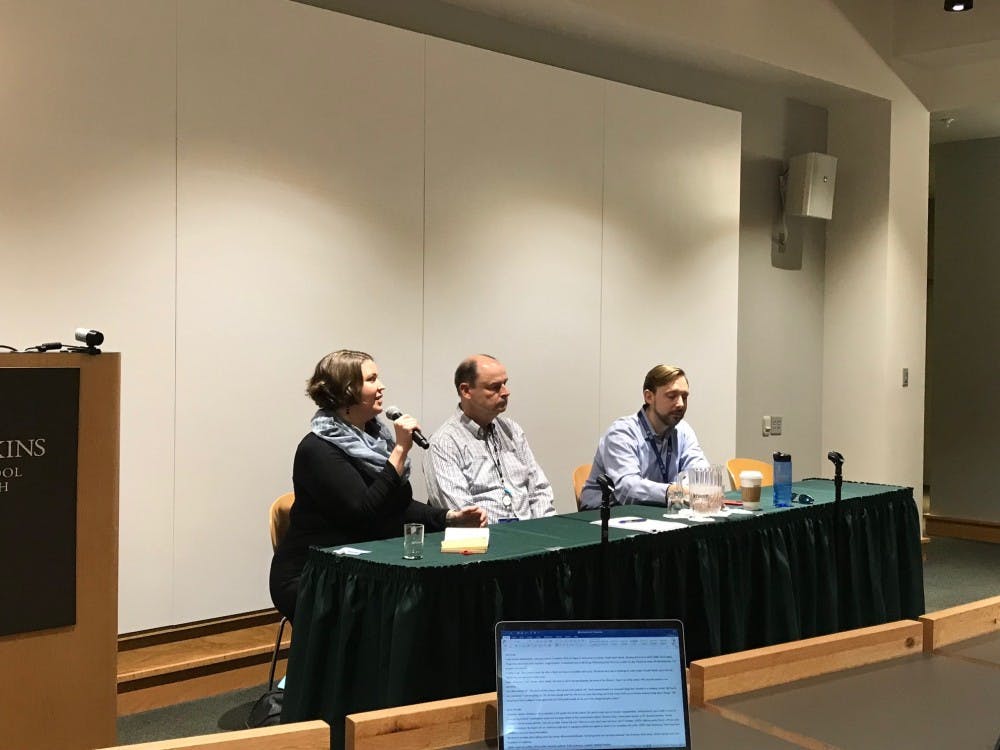The Johns Hopkins Science Policy Group hosted the Science Policy Town Hall, an event where panel members discussed public health policy questions ahead of the midterm elections. The event took place at the Bloomberg School of Public Health on Thursday, Oct. 10. Panelists focused on issues such as the environment, women’s reproductive health and the opioid crisis in the context of the current political climate.
Panelists included Diane Horvath-Cosper, an obstetrician-gynecologist and director of Whole Woman’s Health of Baltimore; Tom Burke, a former science advisor and deputy assistant administrator for the Environmental Protection Agency (EPA) under the Obama administration; and Travis Rieder, an administrative director and scholar at the University’s Berman Institute of Bioethics. Congresswoman Shannon Sneed of the 13th district in East Baltimore also joined the panel later in the discussion.
On June 1, 2017 President Trump withdrew from the international Paris Agreement, an Agreement among member countries of the United Nations Framework Convention on Climate Change (UNFCCC). The Agreement aimed to mitigate and effectively manage the effects of greenhouse emissions.
Burke talked about his experiences in the EPA during the Obama administration, as well as his transition into the current Trump administration.
“On that day when Trump... said the U.S. was going to withdraw from the Paris Agreement, I was watching,” he said. “That was a really low day for me.”
Horvath-Cosper addressed the current political climate surrounding reproductive and sexual health, especially in the context of the Trump administration’s plans to defund Planned Parenthood and the Department of Health and Human Services’ recent decision to place greater constraints on legal definitions of gender.
“This is a terrible time for reproductive and sexual health,“ she said. “I’m sure you’ve probably all noticed.”
Horvath-Cosper compared the current climate to the one that existed under the Obama administration.
“All of the gains that were made in the last administration have, one after another after another, been rolled back,” she said.
Horvath-Cosper further detailed several key issues of public health policy, including access to contraceptives and abortion services as well as LGBTQ rights. She further drew attention to policies in certain states which mislead patients about the abortion process or target abortion providers.
The third panelist, Travis Rieder, addressed the opioid crisis. Rieder believes that the epidemic is less of a partisan issue than it is a collective failure on the part of the U.S. government to effectively manage opioid addictions.
“There’s a sense in which women’s health and climate change are really, really partisan, because people are willing to just lay down a line,” he said. “The opioid crisis isn’t like that.”
Rieder noted that communities that support Trump are often heavily affected by the opioid epidemic.
“I get a lot of comments, deep, heart-felt, terrifying, sad comments from people with ‘MAGA’ [Make America Great Again] in their email or in their handles because Trump country has been devastated by the opioid crisis,” he said.
Burke, too, believes that the opioid crisis is a nonpartisan issue.
“It’s not optimistic, because the situation is horrifyingly bad, but one moment on the metaphorical eve of an election to note here is that the opioid crisis is a bipartisan crisis, and so to the extent that we are absolutely failing to address it is a bipartisan failure,” he said.
Burke is optimistic that public health scientists can work to improve public health through effective communication and political engagement.
“It’s easy to get tribal right now and to think that things are worse than they are. The science is there, the effort is there. You have an incredibly important role to play, and I think that progress can continue,“ he said. “The challenge for us is we’ve got to communicate the importance of our science and how to be involved.”
Horvath-Cosper agreed that political involvement is essential to changing public health policy.
“My hope is that we can continue to push back on these really egregious policies and appeal to the reasonableness of much of the public and some of our lawmakers,“ she said. “Vote. Encourage other people to vote. Keep showing up. Keep being loud.”
The News-Letter interviewed members of Wings, a campus organization that aims to promote menstrual health in underserved communities.
Chanel Lee, co-leader of Wings, discussed the problems that arise when women lack accessibility to menstrual products.
“Women’s health and menstrual health should not be partisan issues,” she said. “If they’re staying home from work because they can’t afford these products... then it has economic consequences that creates a drag on society as well. Women constitute half of the working population and just the population in general, and since a lot of women are the caretakers of children in households, that also has consequences on children and communities.”
Bridget Chen, co-leader of Wings, talked about the importance of starting dialogues to raise awareness and argue for better policies.
“If people aren’t aware of the issue, then how can we expect that policy can change about that?” she said. “If you increase dialogue, that’s the first step to getting anywhere.”
Senior Madison Dutson, the president of Public Health Brigades, an organization which seeks to combat health and economic disparities, talked about the importance of effective communication in public health.
“It’s a lot on us as to how we convey that information, and as public health practitioners, there’s a lot of schooling that goes in to how you communicate results,” she said.
Dutson also spoke about the effects of climate change on human health.
“Climate change is largely caused by pollutants, and those aren’t just affecting the temperature,” she said. “Those also affect human health directly. Things like air pollution, of course, cause asthma and cardiovascular disease.”





